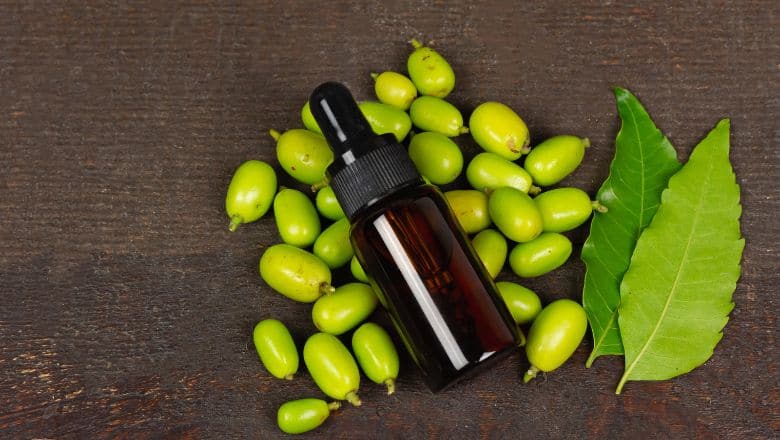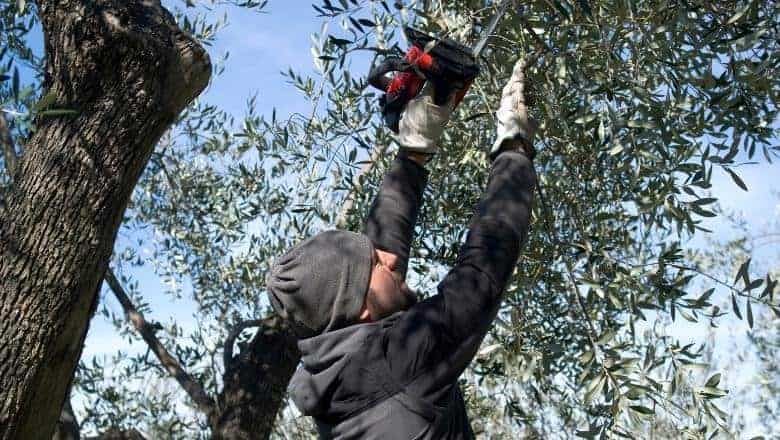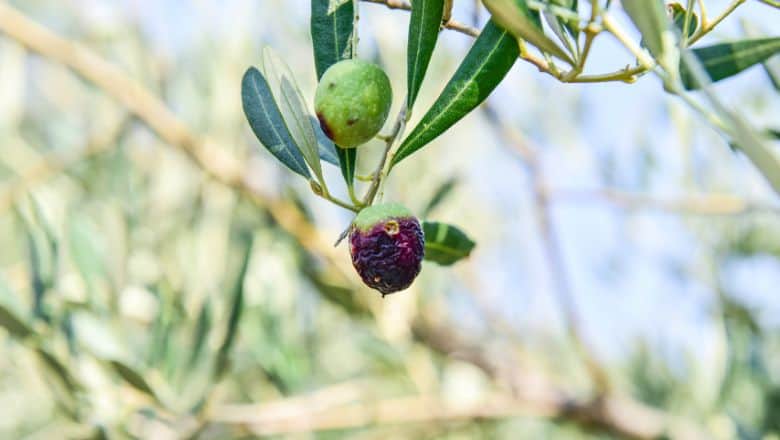How To Protect Olive Trees From Pests
Olive Knowledge is a part of Amazon Associates. As an Amazon Associate, we earn from qualifying purchases. Read our Affiliate Disclosure to learn more.
Like all plants, olive trees attract pests, especially when in fruit. In this article, I will be talking about how to protect olive trees from pests.
I will cover all the different methods and explain which are preferable.
Key Takeaways:
- Olive trees attract pests, especially during fruiting; organic protection methods are preferred.
- Companion planting with lavender, marigolds, petunias, and herbs like borage and rosemary deters pests.
- Regular tree maintenance, mildew checks, and natural treatments like neem oil help prevent infestations.
- Chemical solutions like pesticides, insecticides, and fungicides are used sparingly due to safety concerns.
- Biological methods involve using natural predators, like ladybirds, to control pest populations.
- Proper pruning, watering, and waste disposal are crucial for preventing pests and diseases.
Natural Ways to Protect Olive Trees from Pests
If I can avoid using chemical pesticides, I do so, as do most responsible growers. Let’s look at the best natural methods that help keep pests away from olive trees.
Companion Planting for Olive Trees

Companion planting is a gardener’s favorite, and many beneficial plants exist when it comes to keeping pests away from olive trees. The idea of companion planting is to grow flowers and herbs nearby that keep the pests away from the trees.
Here are some of the best and most recommended companion plants that will help deter common pests:
- Lavender is a popular companion plant with olive tree growers. Its fragrance is not appreciated by many insects that may target your fruit. Lavender also attracts bees, and that is always a good thing.
- To deter common pests such as scale insects and many other species, we recommend planting marigolds. These beautiful and easy-to-grow garden plants work well with olive trees and should be planted a foot or two away from the trees for the best effect.
- Aphids and whiteflies are among the grower’s most annoying pests, and planting petunias has been proven to deter these destructive creatures from olive trees. Petunias a couple of feet from the trees will also add a welcome color display. Nasturtiums are another flower that will attract insects away from your trees.
- Borage is one of many herbs popularly grown by olive growers to attract insects away from the olives. Rosemary, thyme, mint, and sage are also effective. Garlic, onions, and daffodils may not be quite as effective but still have some effect.
All of the above are easy to grow and require little maintenance plus they bring colour to your garden. Next, I’ll be talking about another area of natural protection from pests: the correct care of your olive trees.
Proper Care and Non-chemical Solutions

Pests and diseases are not unusual with olive trees; one way to keep them at bay is to ensure your trees are properly cared for. As a grower, you need to keep on top of problems and take preventative measures.
Here is some advice on how regular maintenance can help protect your trees from common pests and diseases.
- Look for mildew that forms on the leaves. This is a fungus that can seriously damage your olive trees. Also, look for spots on the leaves that can be indicative of diseases such as leaf spots.
- If you are dedicated to using natural treatment, there are solutions that can be of use, but none are guaranteed to help. A milk and water treatment – 1:2 ratio – sprayed onto the leaves is good for treating mildew. Also helpful, and reportedly more successful, is a baking powder mixed with a gallon of soapy water. A tablespoon of powder should be enough.
- Neem oil is a useful organic product that is used by many olive growers to help keep pests at bay. It should be available in gardens or even in health stores.
- Treating the olive fruit fly is more difficult, and unfortunately, this and other insects are likely to be your biggest problem. This is why we need to talk about chemical methods of treating pests on olive trees.
Chemical Ways to Protect Olive Trees from Pests

No grower of olive trees wants to resort to chemical solutions for treating pests, but sometimes it might be the only possible option. Let’s talk about pesticides and insecticides and when they may be the answer to your pest problems.
Pesticides and Olive Trees
Pesticides are used to protect olive trees, especially against the troublesome fruit fly. However, there is genuine concern that these chemicals may not be entirely safe.
Pesticides are a general term for chemical products that can be used to kill pests, weeds, and diseases. We’ll look at some more specific types in a moment.
Glyphosate – an ingredient once widely used in pesticides – has been banned for use in many countries. Gardeners have noticed that modern pesticides are not as effective as those from before the reduction in use of glyphosate.
If you do need to resort to pesticides, we recommend you consult with your garden supplies store for the best advice and avoid this method if at all possible.
Insecticides, Herbicides, and Fungicides
More specific than the term pesticides, there are three further classes of such products that you should be aware of.
They all come under the pesticide banner and are as follows:
- Insecticides – specifically to kill insect infestations.
- Herbicides – these products remove unwanted weeds.
- Fungicides – will kill fungal infections on olive trees.
If you have a specific pest problem, it is worth checking products that target the actual problem. For example, when tackling aphids or the olive fruit fly, you do not want to use a product that kills all insects – bees, butterflies, and so on. When tackling weeds, you don’t want to kill all the plants on the ground.
Here are a few examples of pesticides that are popular because they are natural products rather than synthetic chemical compounds:
- Boric acid will help eradicate ants, cockroaches, and termites.
- Iron phosphate kills slugs and snails and is both effective and harmless.
- Neem and neem oil kill caterpillars and other harmful bugs.
- Pyrethrum is a natural insecticide, but beware, many brands add other chemicals to improve effectiveness.
Once again, please seek expert advice when choosing your treatment, and try out the non-chemical methods mentioned above. Furthermore, while most pesticides are labeled as safe for use around pets, we recommend keeping dogs and cats away from such products when in use.
Biological Methods to Protect Olive Trees from Pests

What do we mean by biological methods? Quite simply, we’re talking about using the environment and the creatures within it.
We’ve already talked about companion planting, in which other plants are good for olive trees. This is an extension of that. Aphids, for example, are a favorite food of the harmless ladybird. Introducing or attracting ladybirds will help keep aphid numbers to a minimum.
Finally, in this section, we’ll have a rerun of the basic methods of protecting your olive trees against pests.
Cultural Methods to Protect Olive Trees from Pests

As we have said earlier, giving your olive trees the proper level of care and attention they need can help protect them from pests. Let’s have a look at things you should do as prevention methods.
- Pruning olive trees is important for their general care – see our step by step guide on pruning – and is also an opportunity to inspect for the common pests and diseases that may affect your trees. Look for any signs of aphids or other insects – especially the olive fruit fly, which can seriously devastate a crop – and take immediate action. Pruning keeps the tree at a sensible height for inspection.
- Watering and keeping the trees healthy is also helpful in preventing pests. A well-fed tree with moist soil will grow more readily and be more resilient to disease.
- Harvest the entire crop, or the olive trees may self-seed in different places. Get rid of any waste or rotting olives in a secure fashion.
Put simply, follow the ground rules for growing olive trees, and you are doing your best to prevent pest infestations.
Next, we want to talk about some of the most common diseases that olive trees are susceptible to that are caused by pests.
Common Diseases in Olive Trees Caused by Pests

There are four factors that may cause disease in olive trees. These are bacteria and viruses, the environment the tree grows in, fungi, and lack of nutrients. We’ve mentioned each of these in brief in the above sections, but we want to talk about the most common diseases in olive trees that are caused by pests.
Pests are not just insects. They can also be fungi or even weeds. Our article on common diseases in olive trees goes into more detail, so we recommend you read through it when finished here.
Let’s have a look at some of the most common diseases in olive trees.
Olive Knot
A bacterial infection that invades a wound in the tree, olive knot destroys shoots and eventually kills branches. Look for swollen areas around wounds. Reduced yield and weakening of the tree results. Olive knot is treated with pesticides containing copper.
Verticillium Wilt
A practically untreatable problem with olive trees, Verticillium Wilt, is caused by a fungus at the root of the tree. New shoots and leaves will wilt and die, and eventually, the tree will follow. Prevention by proper care and attention is the way forward, with regular inspection necessary.
Peacock Spot
Also known as olive leaf spot, this bacterial disease is easy to identify by tell-tale black spots on the leaves. It can spread very quickly, so it needs to be treated immediately using a copper-based pesticide and following the instructions on the product.
Black Scale
Not in itself a disease, the black scale can affect an entire grove and causes other molds and diseases to attack the tree. Regular pruning helps prevent black scale, and pesticides can treat the tree.
Olive Fly
A common pest is the olive fly. Although it will not kill the tree, the eggs laid on the fruit will destroy the olives. A yeast trap will attract the flies, which will then be killed by the yeast.
The above are a handful of the possible diseases that can affect olive trees. See the article we linked to earlier for more detail. Before we finish, here are a few words on why it is best – if at all possible – to stay away from pesticides when treating olive tree diseases and pests.
Why You Should Strive to Use Organic Methods
We’ve talked about pesticides and other chemical treatments for olive tree pests, but we must come back to the possible options that avoid these products. This is important to olive growers who want their products certified organic.
Organic and Top Quality
If you use pesticides or other products on your olives, you may not be granted organic status, which will affect the perceived quality of your product. Talk to your garden supplies store for advice on non-chemical products for treating olive trees, and see our section above.
Fruit Quality
Pesticides may impact the quality of the fruit, which in itself will also affect the quality of olive oil if you are producing such. Use water-based sprays and companion plants where possible before turning to pesticides.
Environmental Damage
Some pesticides may remain in the soil and on the plant for a long time. Older and more damaging pesticides have been known to contaminate the watercourse, but these have largely been eliminated.
Always try and use non-damaging pesticides where possible, and see our guide to common diseases for more information about what to use and when.
FAQs
There are some instances in which you will need to spray your trees – see our section on common diseases above – but the best prevention is correct care for the trees: regular pruning to keep them manageable, keep the soil moist, and make sure they have the necessary nutrients. Always try water-based sprays before using chemicals.
Chemical pesticides should be used on olive trees only where absolutely necessary. Chemicals may reduce the chances of being certified organic and can harm the environment. See the section above about using alternative treatments.
Yes, in instances where they are needed, olive growers may need to resort to using pesticides to protect their trees. However, where possible, this will be avoided to ensure the quality of the fruit.
I hope this article has helped you gain more knowledge about caring for your olive trees and how to handle the many pests that may affect growth and productivity.
